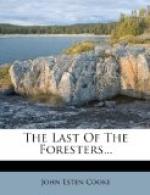“Why does my son ask?”
“Because a bird of the air whispered to me—’You are not a Delaware, nor a Tuscarora, nor a Dacotah; you are a pale face.’ Did the bird lie!”
The old woman did not answer.
“Ma mere,” said Verty, tenderly taking the old woman’s hand and sitting at her feet, “the Great Spirit has made me honest and open—I cannot conceal anything. I cannot pry and search. I might find out this from some other person—who knows? But I will not try. Come! speak with a straight tongue. Am I the son of a brave; am I a Delaware; or am I what my face makes me out—a Long-knife?”
“Ough! ough! ough!” groaned the old woman; “he wants to go, away from the nest where he was warmed, and nursed, and brought up. The Great Spirit has put evil into his heart—it is cold.”
“No, no,” said Verty, earnestly—“my heart is red, not white; every drop of my life-blood is yours, ma mere; you have loved me, cherished me: when my muscles were soft and hot with fever, you laid my head upon your bosom, and rocked me to sleep as softly as the topmost bough of the oak rocks the oriole; you loved me always. My heart shall run out of my breast and soak the ground, before it turns white; yet, I love you, and you love me. But, ma mere, I have grown well nigh to manhood; the bird’s song is changed, and the dove has flown to me—the dove yonder at Apple Orchard—”
“Ough!” groaned the old woman, rocking to and fro; “she is black! She has made you bad!”
“No, no! she is white—she is good. She told me about the Great Spirit, and makes me pure.”
“Ough! ough!”
“She is as pure as the bow in the cloud,” continued Verty; “and I did not mean that the dove was the bird who whispered, that I was no Delaware. No—my own heart says, ‘know—find out.’”
“And why should the heart say ‘know?’” said the old woman, still rocking about, and looking at Verty with anxious affection. “Why should my son seek to find?”
“Because the winds are changed and sing new songs; the leaves whisper, as I pass, with a new voice; and even the clouds are not what they were to me when I ran after the shadows floating along the hills, and across the hollows. I have changed, ma mere, and the streams talk no more with the same tongue. I hear the flags and water-lilies muttering as I pass, and the world opens on me with a new, strange light. They talked to me once; now they laugh at me as I pass. Hear the trees, yonder! Don’t you hear them? They are saying, ’The Delaware paleface! look at him! look at him!’”
And crouching, with dreamy eyes, Verty for a moment listened to the strange sob of the pines, swaying in the chill winds of the autumn night.
“I am not what I was!” he continued; the world is open now, and I must be a part of it. The bear and deer speak to me with tongues I do not understand. Ma mere! ma mere! I must know whether I am a Delaware or pale face!—whether one or the other, I am still yours—yours always! Speak! speak with a straight tongue to your child!”




